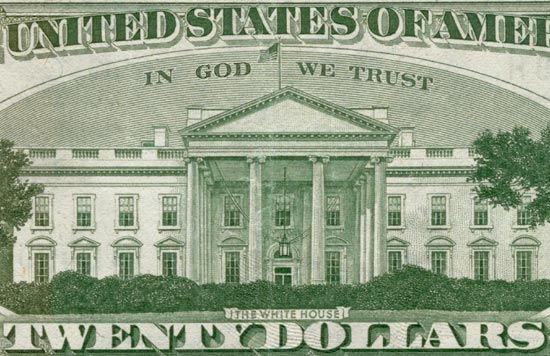Capitalism Abhors a Moral Vacuum
- Paul Knowlton

- Sep 19
- 6 min read
In 1955, President Eisenhower signed into law H.R. 619, legislation that required the inscription 'In God We Trust' to appear on all American paper and coin currency. The first dollar bills that included 'In God We Trust' entered circulation in 1957.
Nice sentiment, 'In God We Trust.' But why and what does it mean?
Representative Charles Bennett, who introduced and advocated for H.R. 619, argued that “Nothing can be more certain than that our country was founded in a spiritual atmosphere with a firm trust in God. . . .While the sentiment of trust in God is universal and timeless, these particular four words, 'In God We Trust,’ are indigenous to our country.” Adding 'In God We Trust' to currency, Bennett believed, would “serve as a constant reminder” that the nation’s political and economic fortunes were tied to its spiritual faith.

Charles Bennett | Image Credit: U.S. House of Representatives
70 years on, America’s current political and economic fortunes are in great disorder, if not 'on the ropes' to use the boxing ring metaphor. So it’s past time to check in with our spiritual faith and revisit what it means to trust God. Given what’s known about Bennett and America’s political atmosphere and economic pace of the mid-1950s, we’re on solid ground turning to the Judeo-Christian tradition of spiritual faith for a sampling about what God said regarding political and economic fortunes.
In God We Trust
At the center of the Torah (aka part of the Old Testament), Leviticus 17-26 is known as the “Holiness Code.” This is an extended series of laws from God about how God's people–those who claim to trust in God–are to live. Chapter 19 in particular has clear economic examples that include social-political implications. Let’s quickly review just a few:

Leviticus 19:9-10: When you reap the harvest of your land, you shall not reap your field right up to its edge, neither shall you gather the gleanings after your harvest. And you shall not strip your vineyard bare, neither shall you gather the fallen grapes of your vineyard. You shall leave them for the poor and the sojourner: I am the Lord your God. [In today’s language: Don’t maximize your profits at the expense of the poor and the stranger.]
Leviticus 19:11: You shall not steal; you shall not deal falsely; you shall not lie to one another. [In today’s language: These commands have the same plain and straightforward meanings. You really have to work hard to get around them.]
Leviticus 19:13: You shall not oppress your neighbor or rob him. The wages of a hired servant shall not remain with you all night until the morning. [In today’s language: Don’t underpay your employees, contractors, or laborers, much less steal from them.]
Leviticus 19:17: You shall not hate your brother in your heart, but you shall reason frankly with your neighbor, lest you incur sin because of him. [In today’s language: Don’t harbor resentment. Have candid, in-person conversations and resolve your differences.]
Leviticus 19:33-34: When a stranger sojourns with you in your land, you shall not do him wrong. You shall treat the stranger who sojourns with you as the native among you, and you shall love him as yourself, for you were strangers in the land of Egypt: I am the Lord your God. [In today’s language: Don’t mistreat people simply because they’re strangers, foreigners, or immigrants, but treat them like your own people. Remember how badly you were treated in Egypt and don’t behave that way to others.]
70 years on, how do you think we Americans are doing on holding close to the spiritual faith that's tied to our political and economic fortunes? In other words, how are we doing living up to 'In God We Trust'?
Do you think our spiritual disorder is the significant reason for our political and economic disorder? The short answer is, "yes."
The Moral Voice of Adam Smith
Let’s imagine you don’t like any connections between anything related to spiritual faith or God and your money or capitalism, even if 'In God We Trust' is in the DNA of all your U.S. issued currency.

Fine. Let’s turn to what the Father of Capitalism said in his first worldwide best-selling book about the basis for our political and economic fortunes. Here’s a sample from the first paragraph of Part II, Section II, Chapter II of Adam Smith’s Theory of Moral Sentiments, the book on which The Wealth of Nations is built. (If you’ve spent any time with Smith’s writings, you know the style of his era is wordy. I’ve tried to keep this quote concise but complete, and you’re encouraged to both trust and verify.)
There can be no proper motive for hurting our neighbour, there can be no incitement to do evil to another which mankind will go along with, except just indignation for evil which that other has done to us. To disturb his happiness merely because it stands in the way of our own, to take from him what is of real use to him merely because it may be of equal or of more use to us, or to indulge, in this manner, at the expense of other people, the natural preference which every man has for his own happiness above that of other people, is what no impartial spectator can go along with. . . . In the race for wealth and honours and preferments, he may run as hard as he can, and strain every nerve and every muscle, in order to outstrip all his competitors. But if he should justle, or throw down any of them, the indulgence of the spectators is entirely at an end. It is a violation of fair play, which they cannot admit of. [In today’s language: There is no justification for initiating any harm or evil against each other. And in your pursuit of personal wealth, there is no justification in you harming or undermining another in order to give yourself an advantage.]
266 years since Smith first published Theory of Moral Sentiments, how should we Americans grade ourselves in our restraint to not inflict political or economic harm or evil against each other?
Do you think the quick ease in which we do inflict harm on each other is a significant reason for our political and economic disorder? The short answer here also is, "yes."
Time to Step Back from Destroying Ourselves
Capitalism is a system that, like any system, runs according to how it is engineered.
Since at least the early 1970s, America’s form of capitalism has been reengineered away from the ethic of 'In God We Trust' and the moral voice of the Father of Capitalism. More specifically, America has allowed itself to be stripped of the ethics and morality that created our Golden Age of Capitalism (1945–mid 1976). Haven't you been taught 'greed is good' and 'maximize profit' and 'dog eat dog' far more often than 'In God We Trust'?

Photo Credit Jenni Jones on Unsplash.com
The results are self-evident. Take an unvarnished look at the economic struggles of the American population as a whole. Wall Street is fine until it needs its next government bailout, because that’s how America's capitalism has been reengineered. Step off Wall Street or K Street, however, and you'll discover the rest of economic and political America is cratering.
Before there is an economic or political collapse from which America cannot recover intact, we need to recover the spiritual faith of 'In God We Trust' and the morality of Adam Smith. We can do this, individually and collectively, but we have to get started in earnest today, if not yesterday. How are we going to fix the American Dream if we don't first fix American Capitalism?

Fix Capitalism. Fix the American Dream.
Our vision is to benefit society by transforming capitalism's current core ethic of 'maximize shareholder value' to the better core ethic of 'optimize mutual value.' We achieve our vision by impacting learning, opinion, beliefs, and policy. Institute for Better Capitalism, Inc.
⭐⭐⭐⭐⭐ Our Amazon number 1 new release: Unleash more with Better Capitalism: Jesus, Adam Smith, Ayn Rand, & MLK Jr. on Moving from Plantation to Partnership Economics.
"This book merits close, sustained attention as a compelling move beyond both careless thinking and easy ideology."—Walter Brueggemann, Columbia Theological Seminary
"Better Capitalism is a sincere search for a better world."—Cato Institute
The Institute for Better Capitalism, Inc., is a 501(c)(3). We invite and are grateful for financial partners in this work. We invite you to donate here or contact us for more information. Thanks!





Comments